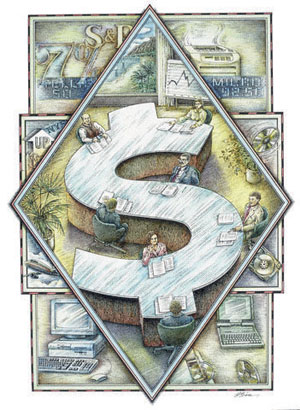Choose The Right Business Valuation Professional
 Create a valuable financial planning tool that captures your true worth.
Create a valuable financial planning tool that captures your true worth.
According to surveys conducted by Accounting Today of the top 100 CPA firms, business valuation is one of the fastest-growing niche services.
The National Association of Certified Valuation Analysts (NACVA) has grown from its two original co-founders in 1991 to an average membership of 5,500, of which 127 are IRS valuators certified through NACVA. As this indicates, business valuation is growing increasingly in recognition and importance.
Some of the growing attention to business valuation can be attributed to the Sarbanes-Oxley Act, the 2002 law that governs public companies’ financial reporting and restricts the nonaudit work accounting firms can perform for public company audit clients.
For private companies, however, demographics are playing a significant part in business valuation demand. Baby Boomers coming of retirement age, who own their own successful businesses and require succession and estate planning, are fueling business valuation demand.
Another reason is the increasing sophistication and tax structuring of business purchases, where both the buyer and seller request an unbiased third-party opinion of value. Furthermore, buy-sell agreements, financial plans and estate plans cannot be written and applied successfully without a business valuation assessment to know the owner’s total business worth.
A business valuation expert will, at a minimum, belong to one of the five professional valuation organizations, and as a member he or she is required to abide by professional valuation standards and practices.
The NACVA, the American Institute of Certified Public Accountants, the American Society of Appraisers, the Institute of Business Appraisers and the Canadian Institute of Chartered Business Valuators all offer accreditation programs.
An accredited valuator provides a level of inoculation, especially with estate-tax matters and related ownership transfers. The vast majority of IRS challenges focus on disputing a taxpayer’s valuation of the business assets.
Aside from issues involving the legality of the estate plan itself, the IRS would only have concerns regarding the amount of tax owed on the transferred asset. If such a dispute arises and progresses to litigation, the result is determined after a battle of the experts.
A taxpayer should not rely on an accountant or on someone else who is not qualified as an appraiser to value a business interest. A taxpayer, most often, has the burden of presenting credible evidence in order to prove the value reported. An opinion of value presented from a qualified, credentialed appraiser many times wards off an IRS dispute or unrealistic valuation claim.
When faced with a taxpayer valuation based on the opinion of an experienced, independent appraiser, the IRS must hire an equally qualified representative to denounce the opinion of the taxpayer’s professional. The IRS’ hired representative must also be able to produce an opinion of value different enough to generate a tax revenue advantage and justify IRS expenditures as a result of the dispute. This cost/benefit analysis can and should work to the advantage of taxpayers who use timely, well- reasoned valuations.
A valuation is also a preventative against gift and estate-tax challenges. There is a three-year statute of limitations on gift transfers; this applies in the estate tax context as well.
Upon the death of a donor, the IRS can go back only three years in examining prior gifts. However, the gift must be adequately valued and disclosed (as defined by Reg. §301.6501(c)-1(f )(2)).
The statute of limitation does not apply for gifts that are not adequately valued and disclosed, including and especially at the time of a donor’s death. Therefore, a business valuation creates a safe harbor for those gifts made more than three years ago.
A business valuation provides business owners the benefit of planning an exit strategy and mapping a course of action for both premeditated and untimely life events.
In short, valuation is more than just a calculation of numbers. It is a valuable financial planning tool that captures a company’s or owner’s worth beyond the balance sheet, and in many cases, considers not only the company’s tangible worth, but intangible value and future expectation.







